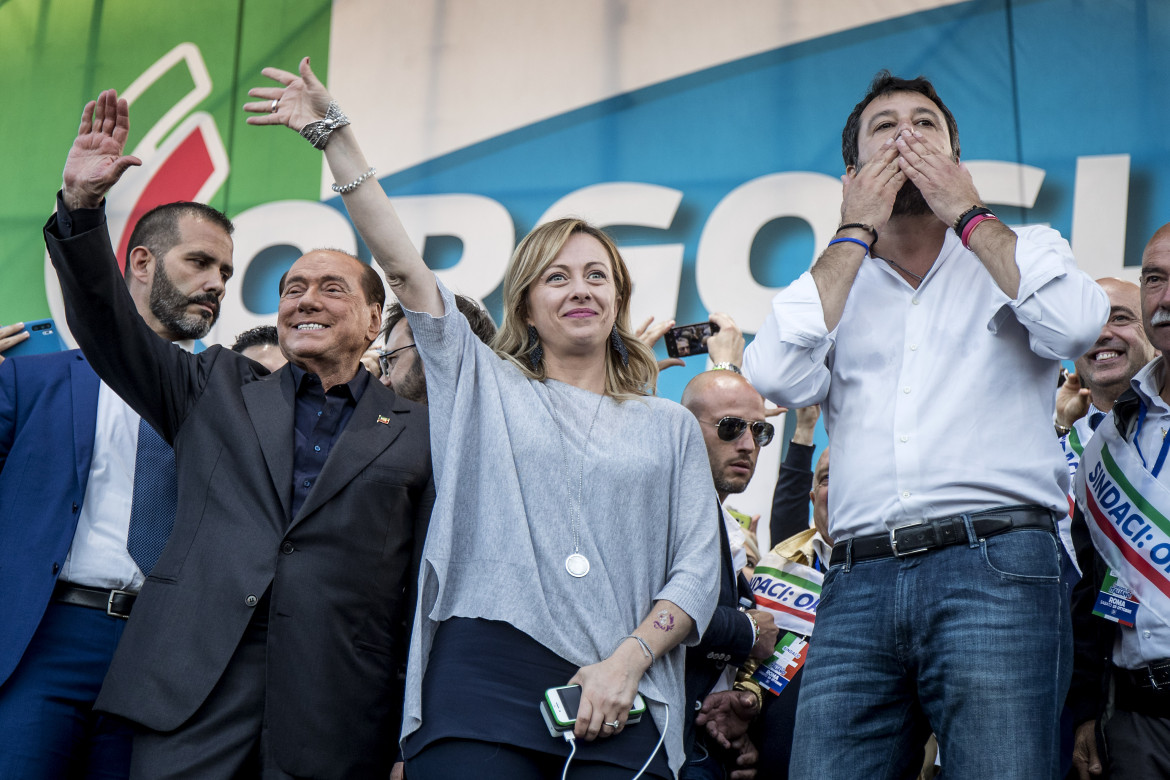Commentary
The right seizes the moment, while the PD is starting from scratch
Unlike the deer-in-the-headlights PD, the centrists in perpetual confusion, or the Five Stars lost in the wilderness, the right marches to the same beat.

From “a million jobs” in 1994 to “a million trees” nowadays: years have gone by, Silvio is getting older, but one can’t say that he’s lost his natural talent for catchphrases and campaign promises that hit the mark. Less taxes – that’s evergreen. A minimum pension of €1,000 per month with 13 payments per year, for everyone, and especially for mothers – another age-old leitmotif. Plus trees, to make Greta’s kids happy.
“The Knight” launched his election program in the usual TV interview on TG5, and since he owns the network, nobody was going to cut him short. The economic manager of Fratelli d’Italia winced in response, barely concealing his skepticism: “Sure, of course … We’ll see if the money will be there.”
That’s a sign he doesn’t really know “the Knight,” or hasn’t understood him. Whether the promises made in an election campaign are achievable or not is of little importance, and Berlusconi, the undisputed wizard of election campaigns, knows this perfectly well; it’s naïve to start nickel-and-diming him. This will be his last campaign: he wants it to be memorable. He has a specific goal: to make a triumphant return, buoyed by the voters’ support, to the Senate which humiliated him by showing him the door. He will use every ounce of skill he still has in order to succeed.
However, it would be superficial to think that the right is limited to the choreography and thunderous salvoes typical of Silvio Berlusconi. Unlike the deer-in-the-headlights PD, the centrists in perpetual confusion, or the Five Stars lost in the wilderness, the right marches to the same beat.
On Friday, Berlusconi and Meloni met and set a new meeting for next week, almost certainly Wednesday at the Chamber, this time also with Salvini and the minor leaders. They have two thorny issues to resolve: that of who would choose the Prime Minister, and the even more urgent one of the makeup of the lists for the alliance in terms of proportions. In both cases, the issue is the same: to either confirm or change the model adopted in 2018.
Back then, it was decided that the party with the most votes would name the candidate for Prime Minister and that the weight of each party in the unified list would be set according to the polls. For Giorgia Meloni, this is a method that is also very suitable for the present; Berlusconi, on the other hand, thinks it would be much better to choose the Prime Minister after the polls close, entrusting the decision to an assembly of the elected, just as Giorgia Meloni proposed unsuccessfully in 2018. But Salvini is siding with FdI: “He who has one more vote decides the Prime Minister.”
As for the list, Berlusconi calls for equal proportions, with 33% of candidates from each party. These are real stumbling blocks, but hoping the right will waste an almost certain victory only to haggle over seats would be the ultimate mistake for its opponents.
And it is also a mistake to move with the sluggishness that defines the PD nowadays. Of course, there is the “Draghi agenda,” touted by the PD together with all centrists, even including Ligurian governor Toti from the center-right. But it’s only a gimmick: the agenda put together by the premier to deal with an urgent situation at the head of a government of national unity cannot be the governing program of one political party for an entire legislature. Trying to have it both ways by adding civil rights as the only additional differentiating element is a clever trick, but one which won’t go far.
Moreover, putting all the focus on the “agenda” means roadblocks when it comes to alliances, an area where the PD, after a strategy built over three years collapsed in just three hours, is now groping around in the dark. Letta finally had clear words to say about an alliance with the M5S, which he called ”impossible,” and in which Conte is still hoping, because hope dies last. Calenda, whose Azione group welcomed Cangini (formerly IV) on Friday, and which ministers Gelmini and Carfagna are also expected to join, thinks this is not enough: “We’re not up for random grab-bag alliances. Both the ‘Draghi agenda’ and the Landini/Verdi agenda make a mockery of the voters. Instead of touting Draghi as some divine figure, the PD must say what it wants to do.” Then there is the Renzi problem, which is always a big one for the PD, with the difficulty of keeping Di Maio and forces like Azione, but also Italia Viva, together in the same tent.
In the current turmoil, the PD didn’t rule out the option of opening its lists to everyone from Di Maio to Speranza, on the principle that whoever wants to stay will stay; and then putting together a coalition – but who knows what that would look like, since Azione is unwilling to ally with Nicola Fratoianni and Angelo Bonelli’s Cocomero. But for now, all talk about the list is only a suggestion, and it’s uncertain if it would even be technically possible. The reality is that the PD still has to position itself at the starting gate, and has very little time left for it.
Originally published at https://ilmanifesto.it/i-dem-nel-rebus-delle-alleanze-destra-gia-partita on 2022-07-23
